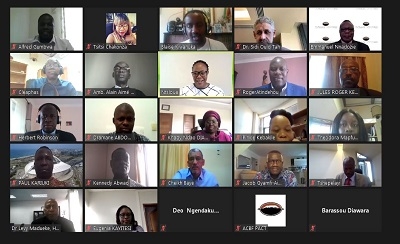
Preamble
- We, the African think tanks and delegates to the 7th Africa Think Tank Summit, met virtually on 18 and 19 November 2020. As we conclude our 2020 Summit on the theme “Implementing the African Continental Free Trade Area (AfCFTA) Agreement: Assessing country readiness and the implications for capacity building”, we express our deepest and sincere appreciation to the African Capacity Building Foundation (ACBF) for convening such a gathering in partnership with the African Development Bank (AfDB), the African Export-Import Bank (Afreximbank), the African Union Commission (AUC), the Arab Bank for Economic Development in Africa (BADEA), the Development Centre for the Organisation for Economic Co-operation (OECD-Dev), the International Cooperation Centre of China’s National Development and Reform Commission (ICC-NDRC), the International Institute for Democracy and Electoral Assistance (International IDEA), the Islamic Development Bank (IsDB), the Southern Voice, the United Nations Economic Commission for Africa (UNECA), and the United Nations Development Programme (UNDP).
- We note that the Summit provided us with the opportunity for stakeholders and development partners to have a good understanding of the capacity challenges posed by COVID-19, factors affecting the readiness of countries and the capacity gaps not only of governments but other key stakeholders – private sector, SMEs, civil society, regional economic communities, and the African Union. The Summit also enabled us to identify the actions including priority capacity building programs required to put the AfCFTA back on track and to build the capacity of key stakeholders (government, private sector, SMEs, civil society, regional economic communities, and the African Union) to improve country readiness.
- We acknowledge that the challenges of COVID-19 can be overcome and the AfCFTA, if duly domesticated by countries and implemented as designed, could help Africa achieve the future we want: “an integrated, prosperous and peaceful Africa”. This is a common dream that underpins the Agenda 2063 and the Sustainable Development Goals.
- We note that African think tanks are able and ready to play a critical role in supporting African countries in tackling AfCFTA implementation issues through evidence-based policy design and implementation, provision of platforms for stakeholder engagement, dialogue, advocacy and capacity development activities for state and non-state actors as well as their monitoring and evaluation to assess progress of the AfCFTA.
African think tanks and the implementation of the AfCFTA
- While we reiterate our deep concern about the challenges facing the implementation of AfCFTA and the negative impact of the COVID-19 pandemic, we recognize the urgent need for capacity building to enhance country readiness and to put the AfCFTA back on track.
- We recognize that think tanks should be the source of the policies for the domestication of the ACFTA, its implementation and monitoring and evaluation at the national, regional and continental levels.
- We commit to providing advice on the policy options and innovative solutions available to successfully tackle the bottlenecks facing the implementation of the AfCFTA using knowledge, research and networking, while expanding our outreach to policy actors and making our research accessible to support the AfCFTA.
- We encourage African governments and key stakeholders, especially the private sector, to work with African think tanks and capacity building institutions to support the expansion, retention and use of capacities required to develop home-grown interventions for the effective implementation of the AfCFTA.
- We recommend that think tanks be supported in conducting strategic studies on human, institutional and transformative leadership capacity gaps facing the continent and to share good practices on how to address them to facilitate the effective implementation of the AfCFTA.
- We enjoin ACBF to coordinate the development of capacity development interventions to address gaps in key areas identified such as mapping of AfCFTA interventions, awareness, commitment and operational readiness, human capital and skills development, digital capacity, institutional and policy support, knowledge sharing and advocacy based on the ACBF’s strategy to accelerate the implementation of AfCFTA in Africa.
Moving forward
- We, think tanks and delegates, note with satisfaction that the 2020 Africa Think Tank Summit provided a unique opportunity for open and comprehensive discussions on a wide range of critical issues affecting the implementation of AfCFTA and the role of think tanks and other key stakeholders, which will facilitate the development of mutually agreed solutions.
- We support the proposal and call upon ACBF, as the specialized Agency of the African Union for capacity development, to coordinate an Africa-wide approach to future capacity building efforts.
- We further call for continued support to ACBF and other supporters of think tanks to enable the creation of new think tanks where needed, strengthen the capacities of existing ones and ensure that platforms such as the Africa Think Tank Summit are convened, and networks such as the Africa Think Tank Network are sustained.
- We are encouraged to know that the key partners such as the AfDB, Afreximbank, AUC, BADEA, IsDB, OECD-Dev, UNECA, UNDP under ACBF coordination will convene a symposium to ensure that the key recommendations of the Summit are implemented and/or taken into consideration by relevant stakeholders.
Presented on 19 November 2020





